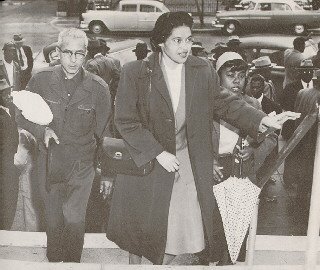"The time is always right to do what is right."
- Martin Luther King, Jr.
Caped wonders with super powers have been created throughout history during times when people were in dire need of "heroes". They could fly or do a Houdini from the arch-rival's snare. But, these heroes stay on the comic book (or the silver screen). Hence, we in the real world face challenges ourselves--sans super powers. Whether it's families breaking apart or declining literacy in the country, it is we who answer the call from where we are, with what we have.

Ihsanullah Khan is long-shot rescuer. A Pakistani immigrant, Khan drove a cab in Washington and pinned his dreams on winning the lottery. Khan always played the same numbers--2, 4, 6, 17, 25 and 31--because they had once appeared in a dream. Every week for 15 years, he bet religiously on the numbers and lost. Then in November 2001, when the jackpot rose to $55.2 million, Khan's lucky numbers finally came through. He pulled his taxi over to the curb, took a deep breath and thought of his mother, whose dying words to him were, "One day, son, you're going to be somebody--like a king."Khan, now 47, didn't necessarily want to be a king. But with after-tax winnings of $32,499,939.24 in his pocket, he decided to return to his native town of Batagram in the Himalayas and run for nazim, or mayor. "I wanted to make changes," he says. "Bring back the good things I saw in America." Khan got his chance.
This year, on Oct. 8, three days after Khan took office as mayor, an earthquake of 7.6 magnitude on the Richter scale slammed into the Himalayas, killing more than 73,000 people in Pakistan. Batagram was one of the worst-hit towns. That morning, Khan had strolled up a dirt path to visit his mother's grave when the force of the quake hurled him to his knees. "I thought it was doomsday, that the earth would open and swallow me up," he says. "The houses on the ridge--they were exploding, one by one."
Read about the other everyday heroes in 6 Tales of Courage at Time.com

The result? "Integrity" was the most looked-up word of 2005, according to Merriam-Webster's online dictionary.
That comes as no surprise to many. The reflex to type a word into www.m-w.com is often prompted by the desire to understand an event and its context. That is one reason "tsunami" and "filibuster" also made the top 10 list.
You can read the full story, along with the Top 10 list, at The Christian Science Monitor. The following is an interesting editorial that likewise delves on buzzwords of 2005:
Portrait of a year in buzzwords
First, the editors of the New Oxford American Dictionary came up with a tech-heavy shortlist and ultimately pronounced "podcast" their Word of the Year. For those of you who think a podcast might have something to do with peas, the word is a combination of iPod and broadcast, and denotes "a digital recording of a radio broadcast or similar program, made available on the Internet for downloading to a personal audio player" (such as an iPod). If you find that arcane, wait till you read the rest of the Oxford list.
A few days later, the people at Merriam-Webster put "integrity" at the top of a news-dominated word list that included such 2005 headline staples as "tsunami" and "conclave."
Full story at The Japan Times
Plan calls for welfare savings to go toward marriage programs.
The president's healthy marriage initiative gained support this week from Concerned Women for America (CWA) and the Fatherhood and Marriage Leadership Institute. The groups are calling for welfare funds to be moved into marriage-strengthening programs.
Janice Crouse, a senior fellow with CWA, said welfare reform worked and she has an idea of what to do with the savings. "Welfare roles are down 60 percent so we have all this money left over that has been designated for welfare payments," she said. "One of the things that we would like to do with that money is bring it over and strengthen marriage."
Full story at Citizen Link
Parents, you need to ask questions of your school administration, this includes teachers, the principal, director of education, director of health, superintendent, and call your school committee members.
Realize that a discussion on transgenderism and “gay”-headed relationships, while claiming to only present reality to children, usually morphs into approval and acceptance. This occurs in a conversation seamlessly and without your notification.

It would turn out to be a fortuitous move. When he returned more than 12 hours later, shuffling to his car with the other frost- breathing commuters, he noticed a box, with a white ribbon, sitting on the front seat.
"Merry Christmas," a note said. "Thank you for leaving your car door unlocked. Instead of stealing your car I gave you a present. Hopefully this will land in the hands of someone you love, for my love is gone now. Merry Christmas to you." Inside was a three-diamond ring set on a white-gold band. Its value: $15,000. It took days for the commuter to tell police, but once he did and a local newspaper reporter noticed it going through the weekly police blotter, the story ricocheted from London to Los Angeles to Oprah. It has become Westborough's own Lord of the Rings saga. Full story at The Christian Science Monitor

The Stricklands and their three young children had just moved to north Everett from Marysville, where they hadn't even known their neighbors.
"They all had garage door openers. They'd drive in, close the door, and we'd never see them," said Jim Strickland, a teacher at Marysville Junior High School.
What began with pecan pie - "my mom's recipe," Jim Strickland said - is now a year-round meal exchange, with four households trading off cooking duties. The arrangement covers dinners Monday through Thursday nights.
"When somebody makes the effort to reach out, especially in a new neighborhood, the response is going to be open arms," Jim Strickland said.

He ran away from home at 14 hoping to earn a living playing the guitar on the streets. But he soon tired of it. He next apprenticed with a blacksmith. Then he heard of the famine in Africa ... and life changed. Lorraine Chandler comes face-to-face with the rebellious spirit of Fredéric Vigneau, MSF's UAE executive director.
It is said everyone wants to be a hero. But this is not true of Fredéric Vigneau, the newly-appointed UAE executive director of Médecins Sans Frontières (MSF) - 'Doctors without Borders'.
Full story at Gulf News
Edward Green, with the Harvard Center for Population and Development Studies, became convinced of the effectiveness of abstinence and faithfulness after witnessing the impact of Uganda’s ABC program on the country’s infection rates. The ABC method, which stands for Abstain, Be faithful, or use a Condom, is credited with dramatically reducing the rate of HIV infection in Uganda since it was first implemented in 1986.
Appearing before the African subcommittee of the U.S. Senate on May 19, 2003, Green stated: “Infection rates [in Uganda] have declined from 21% to 6 % since 1991. Many of us in the AIDS and public health communities didn’t believe that abstinence and faithfulness were realistic goals. It now seems we were wrong.”
Full story at LifeSite

These are essentially the 'invisible people' - people who rarely have grandiose plans for the future.
They just want to grasp the simple pleasures and small attainable goals in life, such as saving enough to send a regular remittance back home, putting a sibling through school/college, trying to finish building a little home for themselves.
Gulf News met with some 'invisible people.'
The invisibles
By Suchitra Bajpai Chaudhary
One "decision" is, of course, whether to terminate the pregnancy — the "A" word (abortion, for those not into subtlety). The less-nuanced, terribly un-P.C., and perhaps you'll consider downright mean among us might use a k-word. The decision being over whether to kill an innocent child, who is completely dependent on his mother's choices. Doctors estimate that between 80 and 90 percent of Down children are now aborted once pre-natal tests issue "warnings."
* * * * *
I know abortion is one of our most contentious issues. People don't want to judge. They don't want to put their rosaries on your ovaries. People often just don't want to talk about it. But we have to talk about it. And we have to especially talk about Down Syndrome and abortion — and this class of people "sophisticated" types seem to think can (and should?) be eliminated. A civilized society cannot tolerate this reality.
As Patricia Bauer put it: "What I don't understand is how we as a society can tacitly write off a whole group of people as having no value. I'd like to think that it's time to put that particular piece of baggage on the table and talk about it, but I'm not optimistic. People want what they want: a perfect baby, a perfect life. To which I say: Good luck. Or maybe, dream on."
Defining Life Down: Are we okay with eliminating a class of humans?
Kathryn Jean Lopez, National Review Online

Thursday, November 10, 2005
By Mary Niederberger, Pittsburgh Post-GazetteSpecial education teacher David Breier had been looking for quite some time for a program that would integrate his students with the rest of the student population at Mt. Lebanon High School.
This fall, with the help of junior Elizabeth Lisowksi, 16, a cheerleader and student council member, a local chapter of Best Buddies International, a group that pairs special needs students with able-bodied students, was founded at the high school.
It didn't take long for Mr. Breier to see the program was just what he had been looking for.
At the homecoming dance last month, cheerleaders, football players and other student leaders invited the special education students, who traditionally congregated in their classroom, onto the dance floor with the rest of the student body.
Both groups of students danced so hard that, Mr. Breier said, he started to worry that some would dehydrate. But that, he said, was a good problem.
Full story at Post-Gazette.com
Since then the clinic, North America's only such operation, has run at capacity, with some 800 heroin injections daily.
"It's all-round positive, with no downsides," said Perry Kendall, British Columbia province's chief medical officer.
Addicts bring in drugs purchased illegally on the street, and self-inject them under medical supervision. There are onsite emergency services in case of overdose and staff nurses and counselors to provide health care and referrals to rehabilitation facilities.
Full story at Breitbart.com


Research is showing the power of expectations, that they have physical -- not just psychological -- effects on your health. Scientists can measure the resulting changes in the brain, from the release of natural painkilling chemicals to alterations in how neurons fire.

Thanks to his hearing aids, he caught her every word.
When a person reaches a certain age, hearing difficulties usually start coming. And Mr. Hite is all of 99 years old, his 100th birthday in less than a month. His age, though, hasn't kept him from going over to a Portland, Oregon abortion clinic every morning and staying patiently on the sidewalk as a gesture demonstrating his life-affirming stand.
Mr. Hite has been honored by pro-life groups and even by the political Constitution Party, and on Dec. 4 he will be honored again with a special Sunday mass and a reception that follows.
"Thou shalt not stand idly by when human life is at stake," he once remarked.
Read the full story about Mr. Hite at Free Republic

Dean Batali, executive producer of That '70s Show, can tell you how to impact television programming - watch more TV. Batali urges readers to find and watch the good stuff on TV and voice their opinion. In praise, that is. Rather than simply criticizing shows (telling a producer you'll never watch their show again tells them that your opinion is now irrelevant to them), Christians should write letters praising aspects of a show that they liked (what's that saying about honey and vinegar?).
The same works for movies, according to Donovan Jacobs. A development executive and script consultant, Jacobs has worked with a wide variety of movie executives and declares that Christians need to make it clear to them that there is a longing for meaningful entertainment. They can do so by praising movies like Spider-Man (and its fantastic theme "With great power comes great responsibility") with as much passion as many Christians exhibit denouncing Harry Potter (for allegedly promoting occultism).
Please read the full article at Townhall.com and get informed!

Mothers who come into my office frequently express doubt about their own judgment, not knowing where to draw the line when their daughters dress provocatively. Girls, meanwhile, freely admit that they are only aping what they see in the media. One young woman told me, "I love 'Sex and the City,' but I know it's contributed" to the problem. " Desperate Housewives" does, too.

A year ago it was all very different. As the leader singer and songwriter for Gaza's first rap group, The Palestinian Rappers, Fara used to kit himself out in standard rapper apparel: a sports jumper three sizes too big, baggy trousers, and a chunky silver necklace that dangled down to his belly-button.
"The people here thought we were trying to be American, which we weren't," says Fara. "But I also realised that the rapping isn't about the clothes, it's about the lyrics."
During the start of the second intifada in September 2000, Fara, along with hundreds of other youths, threw stones at Israeli armoured jeeps and tanks close to the Neve Dekalim settlement which abutted the southern Gaza Strip city of Khan Younis. (All 21 Israeli settlements in Gaza were finally evacuated this summer.)
A bullet fired by an Israeli soldier flew over his head. As he turned to run, another bullet hit his left arm.
"I realised that it's not my way to throw rocks," says Fara, who has fully recovered from his injury. "I realised that, by rapping, my message will be heard by other people."
Fara's interest in rap began as a 12-year-old when he bought bootleg cassettes of US stars such as Puff Daddy, Biggie Smalls and Coolio. But it was Tupac Shakur who really caught Fara's attention.
"He was a man who rapped against racism, against the black and white divide, the rich and the poor, and against the government," says the sociology student at the al-Quds Open University in Khan Younis.
"He rapped about important issues, not about bling, cars and girls. People in the world don't think we're suffering. That's why I resorted to rapping to give people the real message."
You can read the full story at the Sunday Herald
Another feature about the group and life in and around the Gaza Strip, which came out early this year (the Sunday Herald piece was published just this month), is at ZuluNationJapan.com


By John-Henry Westen
BOGOTA, November 17, 2005 (LifeSiteNews.com) - Leaders of the pro-life organization Red Futuro Colombia (The Future of Colombia Network) have requested organizations which believe in the right to life to send e-mails in support of the pro-life cause and in opposition to the very serious current attempts to overturn Colombia's constitutional protection of the right to life. In addition to emails, pro-life leaders are asking for urgent prayers on their behalf.
This South American country has been able for many years to resist the attempts of internationally-backed efforts to legalize abortion. However, they are now confronting their most serious threat, at their Constitutional Court and in their legislature, pro-life leaders tell LifeSiteNews.com. A case brought in April before the Constitutional Court calling for Colombia's laws against abortion to be declared unconstitutional could very well become the "Roe v. Wade" of Colombia. A decision by the Court is expected in days. (see additional LifeSiteNews.com coverage of the case: http://www.lifesite.net/ldn/2005/sep/050914a.html )
Meanwhile renewed pro-abortion efforts in the Federal Legislature are underway.
Red Futuro Colombia and many other organizations together with Church leaders have been responding to these threats. Their most recent activity is a pro-life demonstration this Saturday, Nov. 19th in the Plaza de Bolivar in downtown Bogota, Colombia.
Red Futuro Colombia's leaders have asked for support from other pro-life organizations in other countries who believe in the sacred right to life to please send an email indicating support. Some of these emails will be read publicly at the pro-life demonstration on Saturday and all will be tallied and used to show pro-life international solidarity.
Send your email now to redfuturocolombia@yahoo.com

After a delay in counting of more than a month, official results show women secured seats ahead of male candidates in a quarter of the 34 provinces, while in one a woman was outright winner.
Shukria Barakzai, a women's magazine editor who took the 24th of Kabul's 33 seats, said: "People saw election posters for people who destroyed this city plastered on the walls of Kabul's broken buildings."
Mrs Barakzai said she hoped to stand for the role of speaker in the new parliament: "I want to create a cultural revolution in Afghanistan.
"If a woman becomes the chairperson of the parliament that will show the good aspect of change in Afghanistan."
Read more at Telegraph.co.uk
WASHINGTON SUMMIT ADDRESSES YOUTH ACCESS TO PORN
Officials and advocacy groups discuss keeping
electronic devices smut-free.
http://www.family.org/cforum/news/a0038551.cfm
SENATE HEARING: AMERICA HAS BECOME 'PORNIFIED'
Pornography is an insidious problem that is having
devastating effects.
http://www.family.org/cforum/news/a0038554.cfm
| A stubborn practice |
| By John Lancaster |
| India’s middle class grows, but ugly dowry war tradition persists. Charanpreet Kaur, 19, had been married less than nine months when her husband and his family decided it was time for her to go. Trapping her in the bathroom, her husband clamped his hand over her mouth while his father doused her with kerosene, according to a police document. The father then lit a match, setting his daughter-in-law on fire. She died five days later. Notwithstanding the gold jewellery, colour television set and other finery that served as the price of admission to her husband’s middle-class Sikh household, Charanpreet’s new relations were not satisfied with the bounty and kept demanding more, according to Charanpreet’s relatives and the statement she gave investigators before she died. “Even before this incident my father-in-law used to put pressure on me to get more money,” said the statement by the young woman, who was three months pregnant. Unusual only because Charanpreet lived long enough to point a finger at her alleged attackers, who claimed the fire was accidental, the case underscores the deeply entrenched nature of dowry — and its grim corollary, the murder of young brides whose families fail to ante up — even in the face of rising levels of income and education linked to India’s fast-growing economy.
|
On a more profound level, I would like to discuss with you several principles and concerns.
‘Being is better than having’
The first principle is: Being is better than having.
There are some people who think that if they don’t have the fanciest car or the latest shoes or the shirt with the correct logo, they are “out of it,” not worthy of the esteem of their peers.
You and I know that “being is better than having,” that our essential God-given human dignity is not based upon the possessions which we have. We also know that our dignity is enhanced not by the shirt we wear or the car we drive but by the virtues we manifest and by our authenticity and integrity.
I think you, as advertisers, face a terrible dilemma: you obviously want to sell your product or service, but very few of you, I am convinced, want to make people feel bad or unworthy if they cannot afford to buy the product or service you are advertising.
In short, in your advertising, try not to put poor people down, even subconsciously.
Emphasize quality, emphasize efficiency, emphasize even better grooming and cleanliness and good appearance – but please do not suggest that a possession is going to make one person better than another person.
Perhaps not one of you even or ever intends to communicate that message, but that is the message which some people receive, and some young people, in particular, wind up with a very poor self image; not because of who they are but because of what they do not or cannot afford.
Truth is or at least should be a basic principle in advertising as in all communication, and a basic truth for all of us to consider is that being is prior to and indeed essentially better than having.
Treat each person with respect
A second principle is: Each person must be treated with respect.
It frankly surprises me that, as women rightly fight for equality of treatment in politics and in business, they are still so often exploited in the media in general and in advertising in particular as objects, as sex symbols. Such exploitation has now apparently been extended to men as well.
Thus, while no one would deny the justifiable attraction of love and romance in life, I think we should all resent being treated as objects rather than as persons. We resent it as employees if we are treated as factors of production rather than as persons; we can resent it in advertising if individuals depicted are portrayed as objects rather than as persons and, indeed, if we – the audience of consumers – are treated as so many numbers to be reached instead of as persons to whom an important message is to be communicated.
I would hope that communication in general, including and perhaps especially advertising, would keep in mind the priority of the dignity of the human person: the dignity of the persons portrayed, the dignity of the individual members of the audience to be reached.
- Archbishop John P. Foley
President, Pontifical Council for Social Communications
A copy of Ethics in Advertising in its entirety can be found here

Even with cable and the Internet, many girls still turn to Seventeen, Cosmo Girl and Teen Vogue for the latest on celebrities, fads, fashion, makeup, music, movies, and other “must-buy” products.
Many of these magazines’ articles -- and ads, which can fill as much as 75 percent of the pages -- prey upon girls’ normal adolescent desire to be popular and attractive. They send the damaging message to girls that they are lacking and need certain products to try to make the grade. And they can have quite an impact: Studies have shown a relationship between reading fashion and beauty magazines and loss of self-confidence and healthy body image in girls.
How can we protect the girls in our lives from these hostile messages? Ban the magazines? I don’t advocate that, even though my daughters eventually banned Seventeen themselves, because they felt depressed after reading it. Teen girls need to make such decisions themselves. Rather than turning Cosmo Girl into forbidden fruit, try this:
Read the rest at Common Sense Media
